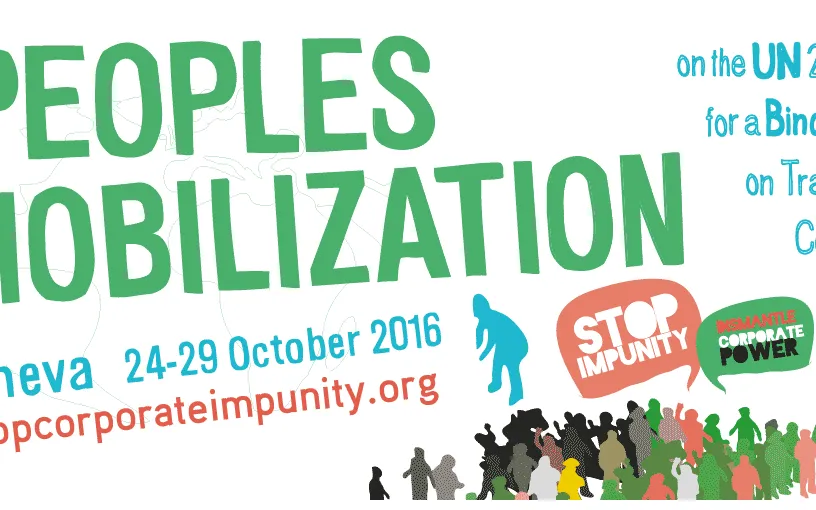Jesús Carrión: “As long as transnational corporations continue to violate human rights, they really cannot talk of CSR”
Jesús Carrión, an activist from RETS and the coordinator of the Col·lectiu Ronda, defends the need to establish international treaties that force corporations to respect these rights.
In this interview, Jesús Carrión, an activist from RETS and the coordinator of the Col·lectiu Ronda, shares his critical view on Corporate Social Responsibility (CSR) and denounces that, for large transnational corporations, this is a “marketing and face-washing strategy”.
In your opinion, what is CSR and what is its purpose?
From a theoretical perspective, CSR is interesting because, on the one hand, it aims to get companies to return to society a part of what they receive, beyond what they are obliged to do by law. On the other hand, it is all about management models whereby corporations include stakeholders that are affected by their activity and, taking them into consideration, they come up with a business plan that, besides having an economic component, also has a social and environmental side.
The problem with Corporate Social Responsibility lies in the roots and is linked to the corporations that have promoted this concept. When a large corporation is violating human rights but uses CSR as a way of explaining that it is responsible, what it is doing is to create a smokescreen between consumers, the governments of countries where it operates, and shareholders, who see the pretty side of it, but do not realise the impact their irresponsible policies have in other countries in Latin America, Africa…
Currently there are adivsors such as FTSE4Good or Dow Jones Sustainability that classify the corporations with the best social responsibility policies for people to invest in them. In these rankings we find, for instance, Inditex, a transnational corporation that has been repeatedly denounced by the Roba Neta (Clean Clothes) campaign, which is far from being a role model regarding labour practices. Here is the problem: for large transnational corporations, CSR is simply marketing and face washing.
Does it really represent a change in terms of corporations being managed in a more ethical and responsible way? Does CSR target large corporations or is it also for small and medium-sized enterprises?
For large transnational corporations, CSR does not bring any change. In Spain, where most corporations listed on the Spanish Ibex 35 stock market have subsidiaries in tax havens and where listed banks invest in arms trade, CSR makes no sense. It is a pipedream. But when we look at small and medium-sized enterprises, it may be useful.
In many cases, especially when referring to transnational corporations, we see a strong contradiction between the best practices in social responsibility they publicise and the actual policies they follow. Is there any way to avoid or control this exploitation?
It would be important to establish regulatory frameworks to force transnational corporations to respect human rights. We need to create control spaces with international tribunals that hold these corporations accountable. This way they could be taken to court when they violate human rights, because right now they have total impunity and can do whatever they like. The Doctor in Law and member of Hegoa, Juan Hernadez Zubizarreta, explained this very nicely: we are under a regime of Lex Mercatoria, which means we have hard law, a commercial and coercive law, which is overarching and “securitises” anything related to trade, TNCs and private property. However, human rights are relegated to CSR, as can be seen in the case of the United Nations Global Compact. Any transnational corporation can join this agreement as long as they accept the 10 principles set out in the compact, but then there is no control or accountability mechanism.
As long as transnational corporations continue to systematically violate human rights, they really cannot talk of CSR. We need a change in the legal framework at a global level to place human rights at the top and to stop any economic or human practices or activities that go against human rights. If we are able to gain this coherence, then we can discuss CSR.
Collaboration among enterprises and social entities is on the rise. In this context, what role should NGOs play to develop social responsibility?
NGOs are divided in two blocks: those that want to remain independent and do not receive funds from transnational corporations, and those that consider that their basic activities are so important that, in receiving funds from these corporations, believe they are contributing to some change.
As I see it, this second category is a big mistake. In this case, what the NGO is doing is to be functional for these TNCs and allows them to take advantage of their good image. Moreover, in many cases, the corporation is responsible fro the situation or problem the NGO is trying to put right or mitigate. This becomes very evident right now when the impoverishment is so brutal in the Catalan and Spanish society. If you are an NGO and try helping those families faced with a problem you also accept funds from companies listed on the Ibex35, which are the ones that have imposed the current labour reforms, with the consequent impact this has had on the resources available to the working class, at the end of the day you’re actually helping these companies.
We talk about CSR in the corporate field, but in the non-profit sector we can neither avoid following social responsibility criteria…
I believe there are other alternatives to CSR that are more interesting and that allow measuring what is being done, such as the Social Stocktaking carried out by the Xarxa d'Economia Solidària XES (Solidarity Economy Network). This initiative adopt a vision on the social impact that goes well beyond the economic impact and is being used by cooperatives and associations working with the criteria fostered by the XES.
One of the main demands of the social movements is to have an International Treaty that forces legally binding obligations on companies to make them respect human rights and stop them being governed by voluntary guidelines with no legal basis just like their CSR. What stage has this proposal reached?
From 24 to 29 October, in Geneva, there is the Mobilisation Week of the Peoples, coinciding with the second session of the UN for a binding treaty on transnational corporations and human rights. This agreement is a proposal that came from the international networks that, for years, have been denouncing the impunity of the transnational corporations and wanted the United Nations to open up a pathway to study the possibility of having an international binding treaty of the peoples for transnational corporations. The key aspect is the word “binding”, which means “the duty to comply with”. A workspace has opened in the UN for the People’s Treaty; however, this shouldn’t be created within this organisation, but should rather be promoted across all continents to clearly state that this is what we want.








Add new comment